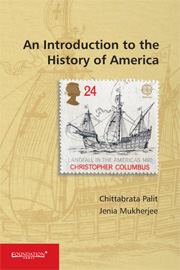Book contents
- Frontmatter
- Contents
- Preface
- Timeline of Events
- 1 An Early History: From Settlement to Colonization
- 2 The American War of Independence
- 3 The Formative Period: The Era of Solidarity and Expansion
- 4 ‘Two Americas’: Regional Differences and Sectional Conflicts
- 5 Agrarian and Industrial Revolutions
- 6 Resisting Voices
- 7 American Foreign Policy: Post-Monroe Doctrine to World War I
- 8 The Great Crisis and Its Recovery
- 9 The Rise of America: WWII and After
- 10 The Quest for Equality
- 11 American Environmentalism and Environmental History
- Epilogue: Perceiving American History Beyond the ‘Exceptionalist’ Framework
- Index
3 - The Formative Period: The Era of Solidarity and Expansion
Published online by Cambridge University Press: 05 April 2014
- Frontmatter
- Contents
- Preface
- Timeline of Events
- 1 An Early History: From Settlement to Colonization
- 2 The American War of Independence
- 3 The Formative Period: The Era of Solidarity and Expansion
- 4 ‘Two Americas’: Regional Differences and Sectional Conflicts
- 5 Agrarian and Industrial Revolutions
- 6 Resisting Voices
- 7 American Foreign Policy: Post-Monroe Doctrine to World War I
- 8 The Great Crisis and Its Recovery
- 9 The Rise of America: WWII and After
- 10 The Quest for Equality
- 11 American Environmentalism and Environmental History
- Epilogue: Perceiving American History Beyond the ‘Exceptionalist’ Framework
- Index
Summary
This chapter is on the political evolution of the newly born American nation. From the history of the election of the first President of the United States and the establishment of the Supreme Court in 1789, we enter into the more complicated and intriguing Jefferson-Hamilton debates in several matters like finance, war, foreign policy, etc. The chapter provides an account of the War of 1812, also known as the ‘second revolutionary war’. American policy towards other states and especially Britain was most important during its ‘formative period’. It concentrated more on the principle of solidarity and internal expansion, and the Monroe Doctrine was the most important contribution to that. Along with the political details of the doctrine, there is a critical interpretation to what it actually meant and the internal and external impact of the reiteration of its principles for the later centuries. American expansion corroborated to the westward movement which determined the very essence of American uniqueness, democracy, and development as Frederick Jackson Turner pointed out. The section on westward expansion is on Turner's ‘frontier thesis’ and how other scholars had responded to it. The chapter ends with detailed narrative of the evolution of judiciary and political parties, the two pillars of American democracy between 1840 and 1860.
a. George Washington and the Jefferson-Hamilton Debate
George Washington, the most powerful military and political leader of America between 1775 and 1799, was born in an affluent, well-connected family of tobacco planters in Virginia that used slave labour.
- Type
- Chapter
- Information
- An Introduction to the History of America , pp. 57 - 105Publisher: Foundation BooksPrint publication year: 2014

